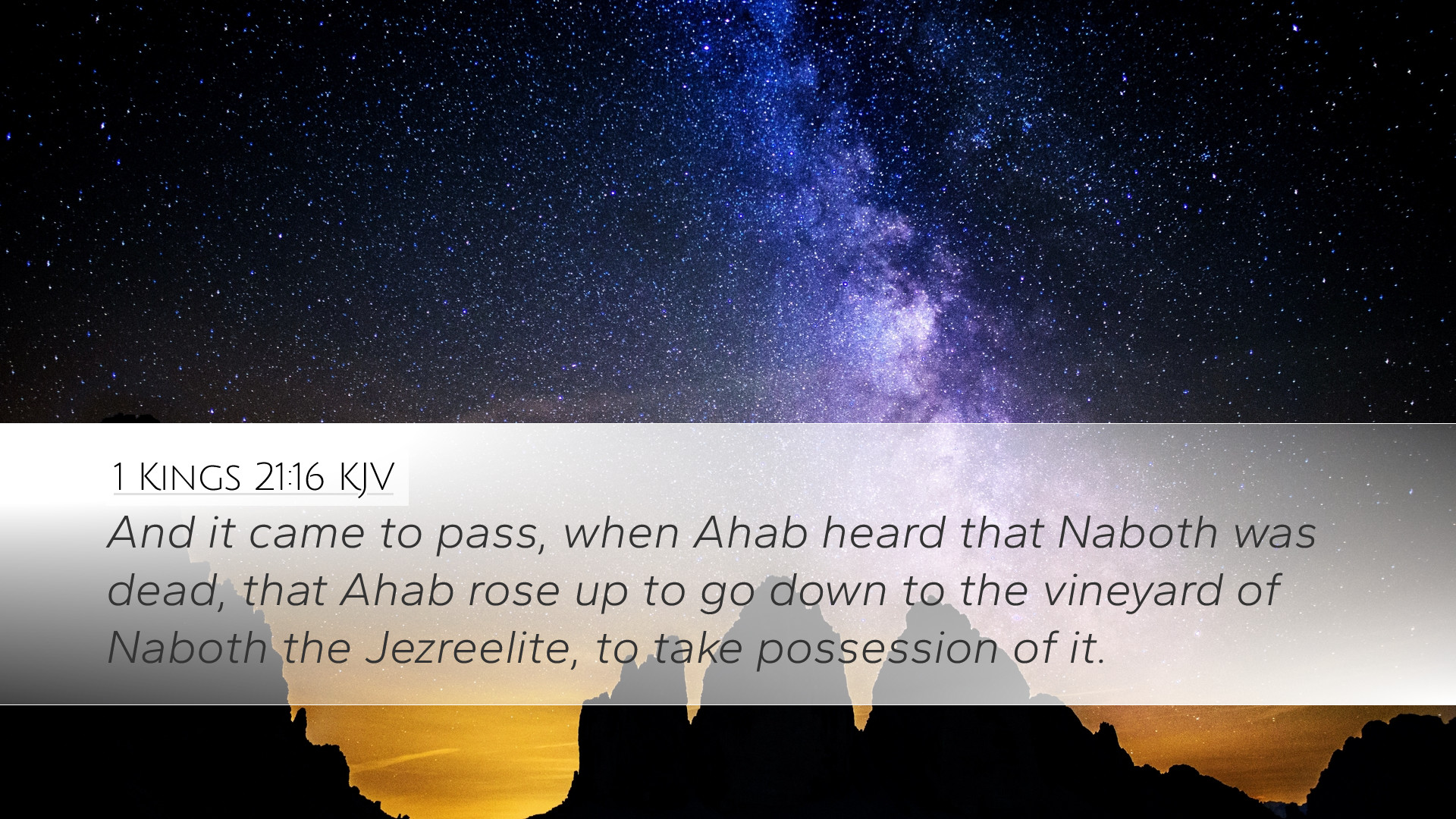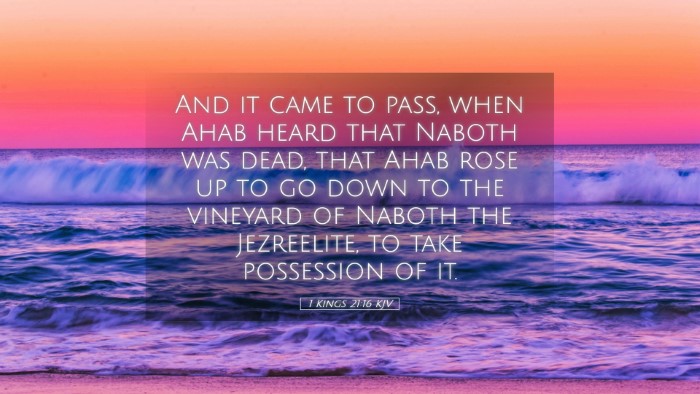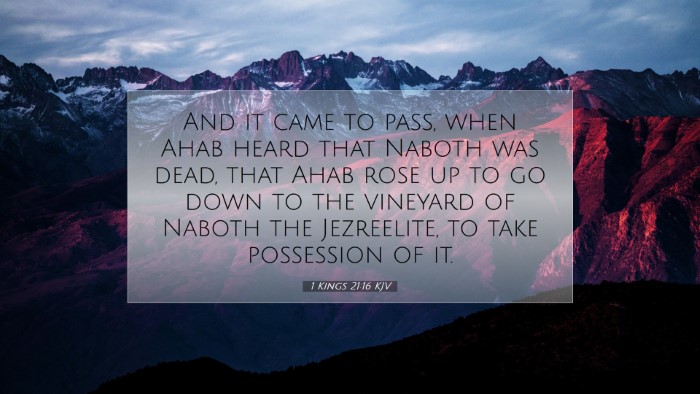Commentary on 1 Kings 21:16
Verse Text: "And it came to pass, when Ahab heard that Naboth was dead, that Ahab rose up to go down to the vineyard of Naboth the Jezreelite, to take possession of it."
Introduction
This verse presents a crucial moment in the narrative of Ahab and Naboth. Here, we witness the culmination of Ahab’s covetousness, manipulation, and moral decay in the court of Israel. This commentary draws insights from prominent public domain sources to explore its theological, moral, and social implications.
Ahab's Character and Actions
Ahab is often portrayed as a deeply flawed ruler, and his actions in this chapter are indicative of his moral corruption. According to Matthew Henry, Ahab’s desire for Naboth’s vineyard wasn't merely a matter of acquiring land; it represented a deeper issue of his inability to accept a "no" and his unwillingness to recognize God's laws pertaining to land ownership.
Furthermore, Albert Barnes observes that Ahab's actions reveal a tyrannical nature; his willingness to eliminate Naboth (through deceit and the orchestrated murder) reflects a ruler more concerned with power than righteousness. Ahab’s disregard for life in pursuit of his desires demonstrates a profound moral failing that resonates throughout biblical history.
The Death of Naboth
The death of Naboth serves as a pivotal event that opens the way for Ahab’s corrupt acquisition of the vineyard. Adam Clarke points out that Naboth's steadfastness in adhering to the inheritance laws (Leviticus 25:23) provides a stark contrast to Ahab’s disregard for divine law. Naboth’s refusal to sell highlights his commitment to God’s commandments, which ultimately leads to his tragic end.
Naboth's unjust execution underscores the theme of the innocent suffering at the hands of the powerful. As Clarke notes, Naboth's fate serves to illustrate the peril of standing firm in one’s convictions against corrupt rulers. This narrative serves as a reminder to biblical scholars and theologians of the costs associated with fidelity to divine principles in the face of oppression.
Ahab's Response
This verse illustrates the moment after Naboth's death when Ahab eagerly seizes the opportunity to take possession of the vineyard. His actions can be interpreted as emblematic of a broader theme of human greed. Matthew Henry indicates that this eagerness reflects Ahab’s character; it exposes the depravity that arises when individuals place their desires above ethical considerations.
Moreover, Ahab's readiness to claim the vineyard immediately after having Naboth killed speaks volumes about his moral state. Albert Barnes argues that Ahab's lack of remorse showcases the coldness that accompanies those who are consumed by greed. His actions betray an egocentric worldview where the sacredness of life is sacrificed on the altar of personal gain.
Theological Implications
The event raises significant theological questions concerning divine justice and the consequences of sin. Adam Clarke notes that the ease with which evil appears to triumph in this narrative may challenge observers; however, it serves to highlight God's ultimate justice. The ensuing narrative in 1 Kings illustrates how God addresses Ahab's actions through the prophet Elijah, emphasizing the certainty of divine retribution against wrongdoing.
There is also a broader reminder here regarding the sovereignty of God over human affairs. In light of Ahab’s sin, it is essential for pastors and theologians to discuss God's sovereignty in permitting human free will while ultimately guiding history toward divine purposes.
Moral Lessons for Leaders
This passage provides an essential moral lesson for leaders within the church and society. Henry emphasizes that leaders are obliged to uphold justice and integrity, particularly concerning the rights and lives of their subjects. Ahab’s transgressions serve as a cautionary tale, reminding the faithful of the serious responsibilities borne by those in positions of authority.
- Integrity in Leadership: Leaders must remain committed to honesty and transparency, putting the well-being of others above personal ambition.
- Consequences of Covetousness: The pursuit of material possessions at the expense of others can lead to devastating outcomes; Ahab's life demonstrates this truth.
- Accountability to God: All leaders will ultimately answer to God for their actions; awareness of this can temper one's decisions with humility and reverence.
Application for Today's Believers
As we reflect on 1 Kings 21:16, modern believers are called to examine their own lives in light of Ahab's choices. The desires of the heart and the integrity of our decisions are crucial in our walk with God. Barnes encourages believers to evaluate their motivations and the impact of their choices on others, ultimately seeking to align their desires with God's will.
Key Applications:
- Prioritizing righteousness over personal gain.
- Valuing integrity and truthfulness in all dealings.
- Recognizing the importance of standing up for what is right, even in the face of opposition.
Conclusion
1 Kings 21:16 serves as a stark reminder of the moral battles that occur at the intersection of power, desire, and righteousness. The narrative of Naboth's death and Ahab's subsequent actions raises enduring questions about integrity in leadership, the place of divine justice, and the necessity of moral courage. As we reflect upon this passage, may we be inspired to pursue God's will in our own lives, ensuring that our ambitions reflect His kingdom values.


